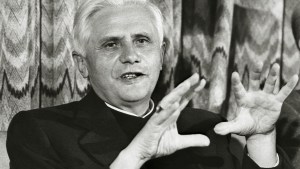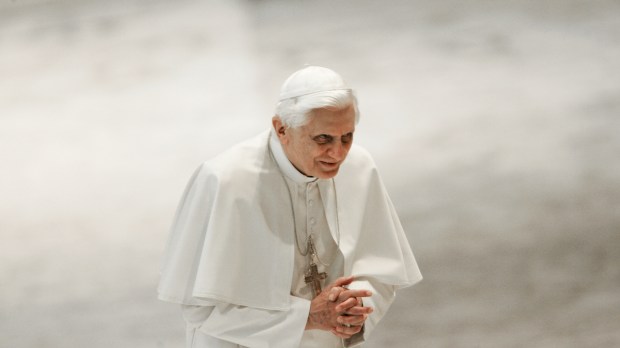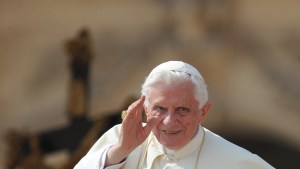Lenten Campaign 2025
This content is free of charge, as are all our articles.
Support us with a donation that is tax-deductible and enable us to continue to reach millions of readers.
Far from the image some people have of a theologian disconnected from the realities of life, Benedict XVI had a very clear perception of the difficulties encountered in living daily in God’s presence.
In an Advent homily in 2009, he noted: “In our daily lives we all experience having little time for the Lord and also little time for ourselves. We end by being absorbed in ‘doing.’” Who hasn’t experienced periods when the number of things we have to do overwhelms us and we no longer have the time or the availability of mind for what’s truly essential?
What is essential?
For Benedict XVI, it’s our encounter with Christ.
“Being Christian is not the result of an ethical choice or a lofty idea, but the encounter with an event, a person, which gives life a new horizon and a decisive direction,” he wrote in his first encyclical, Deus caritas est.
Faith is above all a relationship, an encounter with God. The new decisive direction is to become holy. And the way we advance on the path of holiness is by spending time with Christ regularly, by allowing ourselves to be caught up in his love: “(O)nce you enter into friendship with God, everything in your life begins to change. As you come to know him better, you find you want to reflect something of his infinite goodness in your own life,” he said in his address to teachers and religious at Twickenham University, UK, September 17, 2010.
And in order to become a friend of God, Benedict XVI recommends a few habits that are quite accessible and easy to put in place.
1. Twice a day, have brief contact with God
Every relationship dies if it’s not maintained. This is true for couples, families, and friends, but also for the Lord. That’s why Benedict XVI said, “It means never beginning and never ending a day without at least a brief contact with God.” Not necessarily a prayer, but a thought, a heartfelt gesture, a word of praise or gratitude, at the beginning and end of the day.
2. Every morning, thank the Lord for the gift of faith
In his last general audience on February 27, 2013, Benedict XVI shared a beautiful short prayer and encouraged reciting it daily in the morning to express love for the Lord and to thank him for the gift of faith. Here’s the prayer in question: “I adore you, my God, and I love you with all my heart. I thank you for having created me and made me a Christian.” For Benedict XVI, the gift of faith is “our most precious possession, which no one can take from us!”
3. Every day, find an opportunity to rejoice
“A yearning for joy lurks within the heart of every man and woman,” Benedict XVI said on the 27th World Youth Day in 2012. “Far more than immediate and fleeting feelings of satisfaction, our hearts seek a perfect, full and lasting joy capable of giving ‘flavor’ to our existence.” In order to savor it, we must identify the simple joys that the Lord offers us. Benedict XVI points out to us some reasons for rejoicing:
… the joy of living, the joy of seeing nature’s beauty, the joy of a job well done, the joy of helping others, the joy of sincere and pure love. If we look carefully, we can see many other reasons to rejoice. There are the happy times in family life, shared friendship, the discovery of our talents, our successes, the compliments we receive from others, the ability to express ourselves and to know that we are understood, and the feeling of being of help to others.
4. Every Sunday, encounter Christ in the Eucharist
“I am the living bread that came down from heaven. Whoever eats of this bread will live forever; and the bread that I will give for the life of the world is my flesh.” (Jn 6:51). As a promise of Christ himself, every Eucharistic celebration sacramentally makes present Jesus’ gift of his life. That’s why, for Benedict XVI, “The essential means never leaving a Sunday without an encounter with the Risen Christ in the Eucharist; this is not an additional burden but is light for the whole week.”
5. Every day, take note of a sign from God
In 2009, Benedict XVI was in the vanguard of the idea of the “bullet journal,” a diary in which we would note the signs that God sends us. The purpose is to become aware of and keep a record of how attentive God is to each of his creatures and how much he loves us. “The individual events of the day are hints that God is giving us, signs of the attention he has for each one of us. How often does God give us a glimpse of his love! To keep, as it were, an ‘interior journal’ of this love would be a beautiful and salutary task for our life!” he said.
6. Contemplating works of art
As a musician and music lover, Benedict XVI experienced how beauty leads to God. During a general audience in August 2011, he shared how much a Bach concert in Munich had touched him: “At the end of the last passage, one of the Cantatas, I felt, not by reasoning but in the depths of my heart, that what I had heard had communicated truth to me, the truth of the supreme composer, and impelled me to thank God.” The via pulchritudinis, the “way of beauty,” is one of the ways that can lead to God and help us encounter him.
“There are artistic expressions that are true paths to God, the supreme Beauty, and that even help to grow in our relationship with Him, in prayer,” Benedict XVI affirms. “These are works that were born from faith and express faith. We can see an example of this when we visit a Gothic cathedral: we are enraptured by the vertical lines that soar skywards and uplift our gaze and our spirit,” or when we listen to a piece of sacred music “that plucks at our heartstrings” and “our mind, as it were, expands and turns naturally to God.”
7. Enjoying up the humorous moments of life
In a rather personal interview in preparation for his apostolic trip to Bavaria in September 2006, Benedict XVI emphasized the importance of not taking oneself too seriously and of knowing how to enjoy the little joys of life: “I am not a man who constantly thinks up jokes. But I think it is very important to be able to see the humorous side of life and its joyful dimension and not to take everything too tragically.” And he concludes: “A writer once said that angels can fly because they do not take themselves too seriously. Maybe we could also fly a bit if we did not think we were so important.”
8. Invoke the saints more often
Benedict XVI had a great devotion to and confidence in the saints, “these men and women who with their faith, with their charity, and with their life have been beacons for so many generations, as they are for us too,” he said. At the inaugural Mass of his pontificate on April 24, 2005, he entrusted himself to the vast communion of saints: “All the saints of God are there to protect me, to sustain me and to carry me.”
He invites all the baptized to do the same, more specifically by “following their example, seeking their intercession, entering into communion with them.” For he says (quoting Lumen Gentium), “our companionship with the saints joins us to Christ, from whom as from their fountain and head issue every grace and the life of the People of God itself.”
9. Take time for silence
Despite the busyness of life, Benedict XVI invites us to take regular times of silence, a reliable path to meeting God, a space to let “joy, concerns, suffering” speak, an essential time to discern what is important from what is useless or incidental. “It is hardly surprising that different religious traditions consider solitude and silence as privileged states which help people to rediscover themselves and that Truth which gives meaning to all things,” he noted in his message for the 46th World Day of Social Communications in May 2012. “If God speaks to us even in silence, we in turn discover in silence the possibility of speaking with God and about God.”



